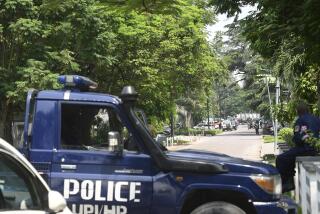Ivory Coast Remains Volatile After Failed Coup
- Share via
NAIROBI, Kenya — A failed coup in Ivory Coast that followed more than a year of turmoil further diminished hopes Monday that the country could regain its reputation as a bastion of peace and stability in West Africa.
Mutinous soldiers seized state broadcast facilities overnight and called on supporters to join their attempt to grab power from an administration that has been in office less than three months.
By noon Monday, Ivorian government officials reported that loyalist forces had quashed the coup attempt.
The aborted coup was the latest episode of violent revolt in a country fast becoming accustomed to political and ethnic chaos.
Analysts said the key to reestablishing long-term stability is the willingness of President Laurent Gbagbo’s government to make good on its promise to promote national unity. For now, however, the once tranquil cocoa-producing country will find it difficult to relinquish its spot in Africa’s wide and disreputable league of volatile nations.
“The political scene is so fractured, unthinkable things can happen,” said I. William Zartman, Washington-based director of African studies and conflict management programs at Johns Hopkins University. “It will be difficult to put the genie back into the bottle.”
Heavy gunfire erupted at the radio station in the central plateau district of Ivory Coast’s commercial capital, Abidjan, just before midnight Sunday, witnesses said. State television headquarters in the district of Cocody was attacked at the same time, and both were captured by the rebels.
Two paramilitary gendarmes were reported killed on the loyalist side, but casualty figures for the rebels were unclear. Defense Ministry officials said about 15 renegade soldiers had been captured. Overall, at least 31 people were arrested.
“Rebel elements tried to take the radio, television and the residence of the president,” Interior Minister Emile Boga Doudou said in an announcement on state radio. “These rebel forces have been routed.”
Witnesses, who confirmed that fierce fighting had taken place during the recapture of the television station, said the situation had stabilized by midafternoon.
“Things have calmed down here,” said Moussa Sy, a teacher who lives in the vicinity of the city’s main military base. “But people are not allowed to go to work. We have been told to wait until tomorrow.”
Sy, who spoke by phone from Abidjan, said bursts of gunfire had been heard throughout the night.
The government has not said who might be behind the putsch in the former French colony, but Defense Ministry officials claimed that they had been aware of the plot and decided to let it proceed in order to catch the perpetrators.
Instability in Ivory Coast began in December 1999, with a military revolt over pay. It quickly turned into a putsch that brought Gen. Robert Guei to power. His rule ended 10 months later in a people’s revolt after he tried to rig a presidential election that Gbagbo was widely thought to have won.
But celebrations of people power quickly degenerated into violence between predominantly Christian government supporters and followers of Alassane Ouattara, a former prime minister who is a Muslim from the north of the country. The courts barred Ouattara from running in the presidential and parliamentary elections last year because of doubts about his nationality. Angry supporters took to the streets.
At least 200 people have been killed in ethnic and political violence since October.
Gbagbo has been widely criticized for failing to reach a compromise with Ouattara’s supporters.
“What Gbagbo has to do is reconcile and open up the political scene to those people who want to take part in it,” Zartman said. “If the coup comes simply from dissident military, young guys who want their salaries, he has to mend fences with the military and make sure that he has all the generals on board, so there is no leadership at the top if the underlings get out of hand.”
Government officials have accused Guei, who has taken refuge in his home village, of recruiting mercenaries in neighboring Liberia for a possible comeback. Many of the general’s foes believe that he might be behind the latest coup attempt.
Political upheaval has left many Ivorians uneasy. Some question whether Gbagbo will be able to quell the violence, promote inclusiveness and secure a lasting peace.
“The atmosphere has been very tense here,” said Sy, the educator. “People feel anxious. People feel nervous. So far, the president has not taken any real action. He hasn’t done anything to prove he is in control of the situation.”
More to Read
Sign up for Essential California
The most important California stories and recommendations in your inbox every morning.
You may occasionally receive promotional content from the Los Angeles Times.











